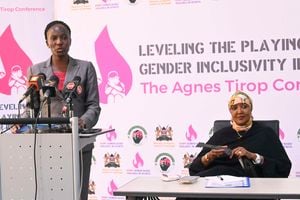
President’s advisor on women rights, Harriette Chiggai (centre), shares a moment with marathoner Viola Lagat during the launch of a report on gender-based violence among women in sports in Eldoret on December 11, 2024.
Inappropriate interaction with coaches is a major contributing factor to gender-based violence among women in sports, a report has shown.
The report, titled ‘Exploring Sexual and Gender-Based Violence Against Women in Sport in Kenya: Causes, Impacts and Interventions” was produced from a survey done by the Aga Khan University in Kenya between September and November.
It has revealed that varying coaching styles which entail coaches hosting athletes at their homes for training, and physiotherapy sessions done by coaches at their private homes, as well as myths surrounding sexuality, are the major contributors to sexual and gender-based violence in sports.
The survey was commissioned by the Office of the President, and was carried out among respondents from 20 local sports federations.
A majority of the respondents in the survey were aged between 25 and 44 years. A similar survey is ongoing in Uganda and Tanzania.
Half of the 71 respondents interviewed said that coaching style is a major contributor factor to a culture of gender-based violence and sexual exploitation or abuse in sports.
The survey, whose findings were released in Eldoret yesterday, found out that verbal abuse is the most prevalent form of sexual and gender-based violence in sports.
Other form of sexual and gender-based violence in sports that came up include emotional abuse, sexual harassment, sexual exploitation, among other forms of abuse.
The survey found that fear of retaliation discourages the victims from reporting cases of gender-based to authorities.
Thirty-nine percent of the respondents said that fear of retaliation or fear of negative consequences on their careers prevented them from reporting acts of gender-based violence, while lack of awareness and education accounted for 14 percent.
Other factors that discourage victims from reporting cases of gender-based violence are shame or stigma associated with being a victim (13 percent), lack of legal action against the perpetrators (11 percent), lack of clear or accessible reporting channels (seven percent), fear of not being believed or heard (three percent), and lack of trust in reporting mechanisms.
The survey also found out that fans and spectators are the most notorious perpetrators of sexual and gender- based violence in sports.
Thirty-eight percent of the respondents said fans were the leading perpetrators of the vice, followed by coaches (21 percent), team officials and sports administrators (16 percent).
The survey found that education and awareness, and stricter policies and penalties are the most effective interventions that can reduce gender-based violence in sports.
“The findings show that female athletes, most of them young and inexperienced, are at the mercy of their male coaches, team mates and managers who are the leading abusers."
Harriette Chiggai who is the president’s advisor on women’s rights issues, said yesterday during the launch of the report.






